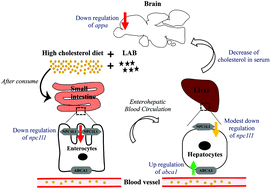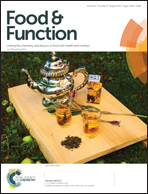Cholesterol lowering by Pediococcus acidilactici LAB4 and Lactobacillus plantarum LAB12 in adult zebrafish is associated with improved memory and involves an interplay between npc1l1 and abca1†
Abstract
This study assessed the cholesterol lowering effect of Pediococcus acidilactici LAB4 and Lactobacillus plantarum LAB12 using adult zebrafish. Animals were fed with a high cholesterol diet (HCD) with/without LAB for seven weeks. Serum and liver cholesterol was quantified using colorimetric and dye staining methods. Expressions of npc1l1 and abca1 in the liver and intestine and appa in the brain were quantified using RT-PCR. Serum and liver cholesterol was significantly lowered in LAB4- and LAB12-fed zebrafish (≤64% and ≤71%, respectively), with reduced liver cholesterol deposition. The cholesterol lowering effect was accompanied by down-regulation of npc1l1 in intestines (≤28.7%), up-regulation of abca1 in the liver (≥30.5%) and down-regulation of appa in the brain (≤24.5%). A moderately strong positive Pearson correlation (r = 0.617, p < 0.01) was found between appa and serum cholesterol. LAB-fed zebrafish exhibited improved spatial learning and memory. LAB4 and LAB12 can be potentially used in preventing hypercholesterolaemia and Alzheimer's diseases.



 Please wait while we load your content...
Please wait while we load your content...